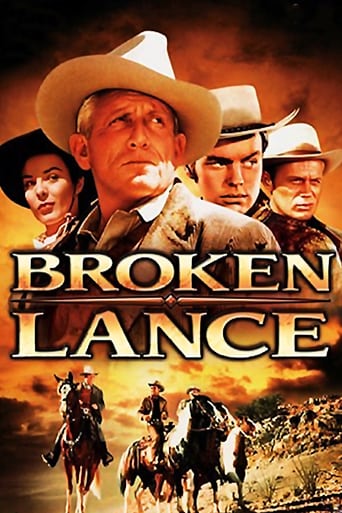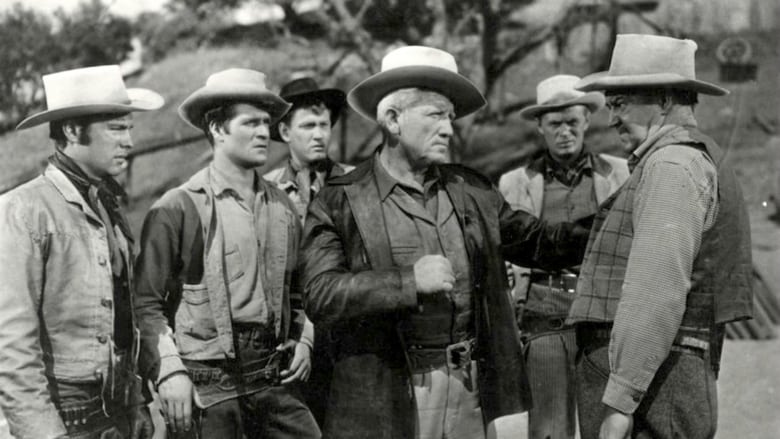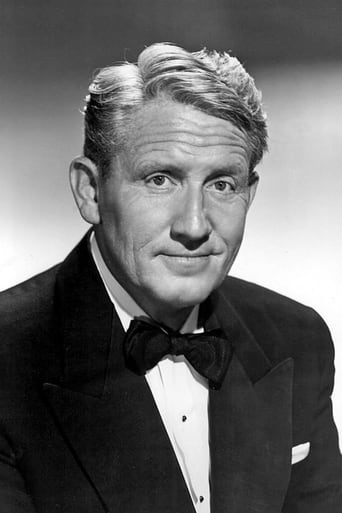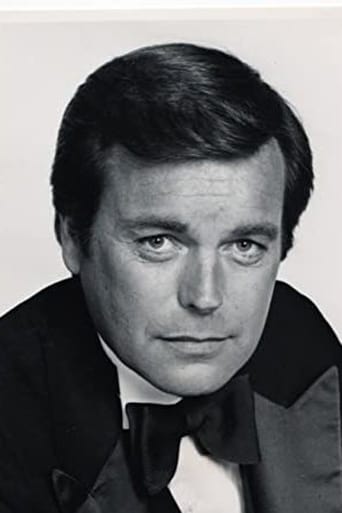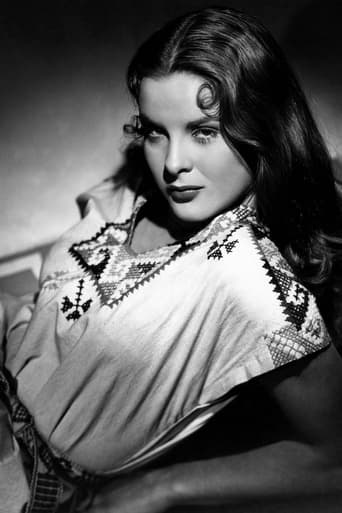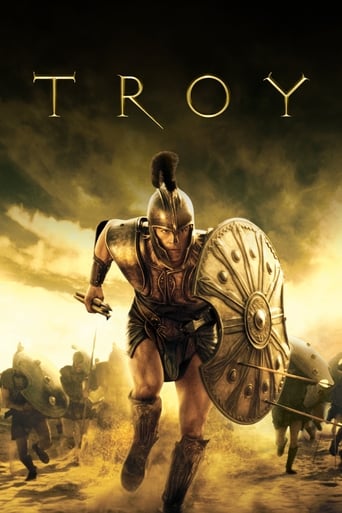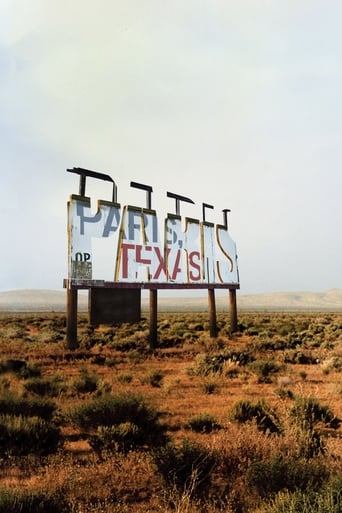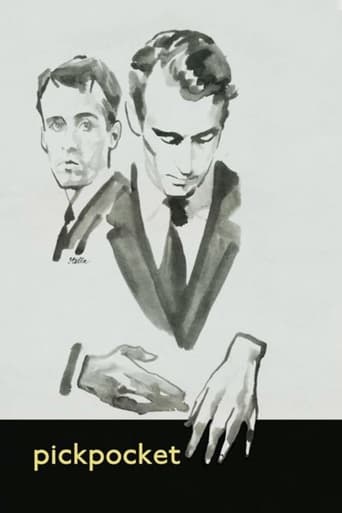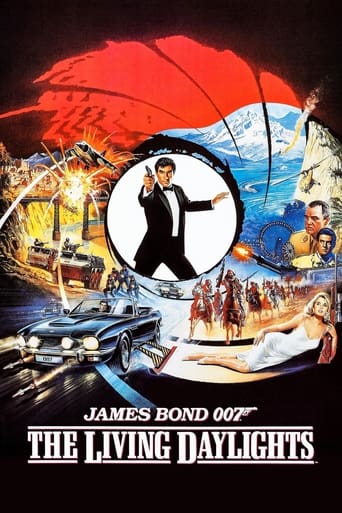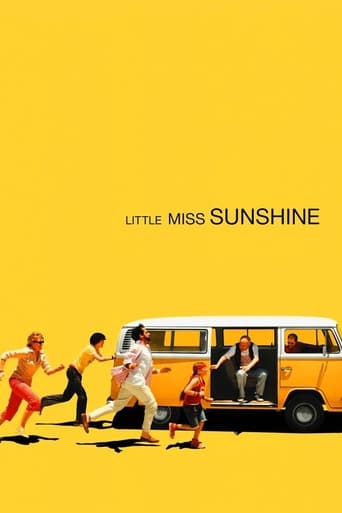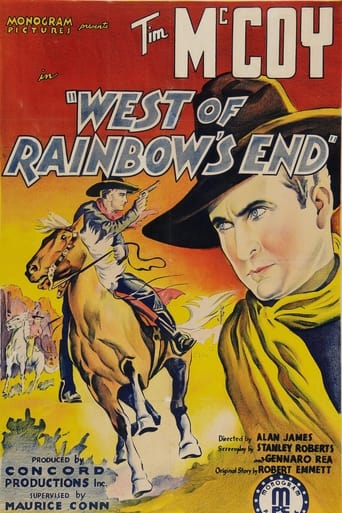Broken Lance (1954)
Cattle baron Matt Devereaux raids a copper smelter that is polluting his water, then divides his property among his sons. Son Joe takes responsibility for the raid and gets three years in prison. Matt dies from a stroke partly caused by his rebellious sons and when Joe gets out he plans revenge.
Watch Trailer
Cast
Similar titles

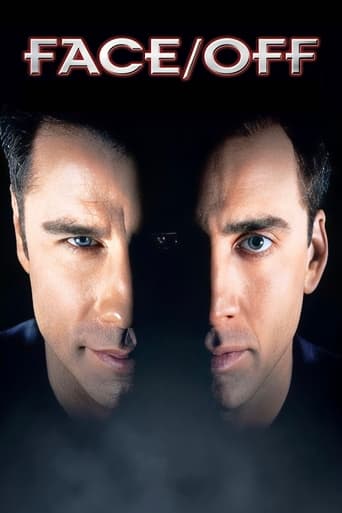
Reviews
Sadly Over-hyped
Just perfect...
Did you people see the same film I saw?
Through painfully honest and emotional moments, the movie becomes irresistibly relatable
The first of director Edward Dmytryk's four oaters, "Broken Lance" draws its title from the clash between Robert Wagner and Richard Widmark, the sons of Spencer Tracy's patriarchal figure, in ad sprawling horse opera about a cattle baron and his offspring. Joe MacDonald's Cinemascope lensing imbues this soap opera with a sprawling sense of dignity, and Dmytryk prefers to use compositions that accentuate real-life settings. Furthermore, Dmytryk was so enamored of the 2:35.1 compositional frame that he rarely cut into the various long shots that appear in this melodrama. No stranger to westerns, MacDonald lensed John Ford's "My Darling Clementine," William A. Wellman's "Yellow Sky" and Dmytryk's "Warlock." For the record, "Broken Lance" is a remake of the 1949 Edward G. Robinson contemporary melodrama "House of Strangers." This frontier yarn benefits from a superb cast and stunning scenery, but the story is hopelessly lame. "Broken Lance" concerns the twilight of the cattle industry because the Richard Murphy screenplay deals with Spencer Tracy's baron after he has made himself into a central figure influential enough to install his own personal choice for governor in the office. The plot deals with a showdown between Tracy's cattle baron and a copper mining outfit's organization. Sadly, "Broken Lance" doesn't boast enough audacious scenes to offset the long stretches of talking among the principals. Nothing surpasses the scene where Wagner pulls another man's gun and blasts a rattler poised to strike in the first part of the film. After this interesting opening, "Broken Lance" degenerates into a loquacious soap opera. Three-fourths of the action occurs in flashback as we follow Wagner after he serves a three-year stretch in prison and comes home to find everything changed with the passage of his father. Spencer Tracy's patriarchal figure Matt Devereaux has four sons. Three of them came from his first wife, while the Robert Wagner character was the product of Matt's third marriage to an Indian (Katy Jurado of "High Noon"). "Broken Lance" appropriates a social consciousness stance because it favors the emergence of Robert Wagner' half-breed adult and how he contends with his racist siblings. Richard Widmark, Hugh O'Brien, and Earl Holliman are cast as Matt's American children that he loathes as much as they hate him. The main crisis occurs when Matt and his sons discover 40 of their cattle have died from drinking from a river contaminated by a copper mine. Altogether, "Broken Lance") isn't very exciting.
As the film begins Joe Devereaux is picked up and told that he is being taken to see the state governor; when he gets there he learns of a deal that has been struck between the governor and his three brothers he has just finished a three year jail sentence and they want him well away; to this end they give him ten thousand dollars and instructions to be on the night train to Oregon. Instead of accepting the deal he throws the money in the spittoon and rides back to his family's ranch; it has been abandoned for some time but a portrait of his father still hangs over the fireplace. The action then jumps back a few years to when his father Matt Devereaux was still alive and running the ranch. We quickly learn that he is a hard man who pays his sons the same amount that he pays the rest of his hands and thinks nothing of trying to trick Barbara, the governor's daughter, into eating a chilli pepper during dinner. She eats it even after being told what it is and after dinner she and Joe spend some time together and grow close. Shortly afterwards the governor tells Matt that he doesn't want Joe seeing her because he is half Indian; it is clear that this prejudice is the thing that offends Matt the most. Soon afterwards they discover some of their cattle dead; poisoned by the run-off from the nearby copper mine. When they go to visit the manager a confrontation ensues and the mine buildings are destroyed. This is the beginning of the end for Matt; taken to court, he faces losing everything till Joe claims to have drawn first; he is jailed so Matt decides to settle his other sons won't allow it though. Joe ends up spending three years in jail and his father gradually fades away and dies while his brothers run the ranch the way they want under the leadership of eldest brother Ben. When events catch up with what we saw in the opening scenes Joe says he intends to leave with Barbara; Ben has other ideas though and the two of them must confront each other.This western was different from most I've seen; usually the cattlemen are fighting each other or trying to run farmers off their land but here a cattleman is in conflict with a mining company and the conflict is resolved on the floor of a courtroom not in the middle of the street with a pair of six-shooters. Spencer Tracy did a fine job as the elderly Matt Devereaux; portraying him as a strong, harsh man who did have a protective side towards his Indian wife and half-Indian youngest son; as his character became broken he remained believable. Robert Wagner did a good job as Joe and Richard Widmark impressed as Ben, the eldest brother who had a long standing, and to a degree justified grievance against his father. Often in films of this era the Native Americans are portrayed as the villains but this film treats them far more sympathetically with one protagonist married to an Indian woman and the other, his son, half Indian; this made a refreshing change. While this isn't this most action packed western I've seen it has enough and the story is good; I'd certainly recommend it to fans of the genre.
One of the more interesting westerns of its era, and pre-dating "Giant", "Hud" and "The Searchers" (three films it resembles) by a number of years, Edward Dmytryk's "Broken Lance" is a Shakespearean western starring Spencer Tracy as a hard-as-nails ranch owner whose mistreatment of his sons proves to have dangerous consequences. There are touches of "King Lear" here, but the film is more fascinating as a political artifact, with its idealised, interracial, inter-ethnic marriages (a white Irish American and a Commanche Native American etc), its treatment of racism, prejudice, envy, and its flashback structure, which hammers home the way in which history, personal and national, always determines the present.The film features actor Spencer Tracy in another of his politically charged roles. Here the polluting of a river which runs through Tracy's land is aligned to the perceived "polluting" of "pure bred" American bloodlines with Native American blood, the polluting of politics with corruption and the polluting of paternal love and responsibility. Dmytryk then folds the hatred of "half breeds" and "faux Americans" onto Tracy's tyrannical hatred of his own, "pure bred" American sons, raising all sorts of issues regarding the genesis of racism, hate and self-hate. Tracy may privilege Native Americans, but how much does his animosity to whites fuel their own racism? After some moments of Greek Tragedy and some moments of melodramatic romance, the film then turns into a revenge plot, a young kid (half white, half native) called Joe setting out to kill his three (white) stepbrothers, whom he blames for the death of his father. While modern viewers will find the film dated in some respects, "Broken Lance" is nevertheless one of the more ambitious westerns of the 1950s, and plays like a sequel to Fred Zinnemann's politically charged, but ultimately dubious "High Noon". Dmytryk often tackled prejudice and abuses of power, most notably in "Crossfire", the first noir to focus on anti-semitism. He was a member of the American Communist party, but cracked under the pressure of McCarthyism. In 1951 he'd appear before the House of Un-American Activities Committee, where he'd name almost thirty former members of various left-wing groups. Dmytryk was imprisoned for several months in the 40s (during the Second Red Scare). Films like "Tender Comrade", which he made in 1943, were used to label him a dissident. "Broken Lance" is a remake of Joseph Mankiewicz's "House of Strangers", but also bares obvious resemblances to Shakespeare's "King Lear", in which a king divides his kingdom between several squabbling sons, to disastrous effect. See Kurosawa's "Ran" for one of the better renditions of "Lear".8/10 – Seen in context, this is one of the better westerns of its era. Worth one viewing.
In this remake of the excellent 1949 film "House of Strangers," the genre is shifted from Film Noir to Western. Unfortunately, it turns into a rather routine oater about a feuding family that falls far short of the original. Tracy is fine as the patriarch, a role played by Edward G. Robinson in the earlier film. Widmark, O'Brian, Holliman, and Wagner play the sons with the last being Tracy's favorite, leading to family friction. Peters plays Wagner's love interest but their relationship lacks the spark and snappy dialog of Richard Conte and Susan Hayward in the first film. Jurado, as Tracy's Indian wife, has little to do except say, "my hose-bund."
